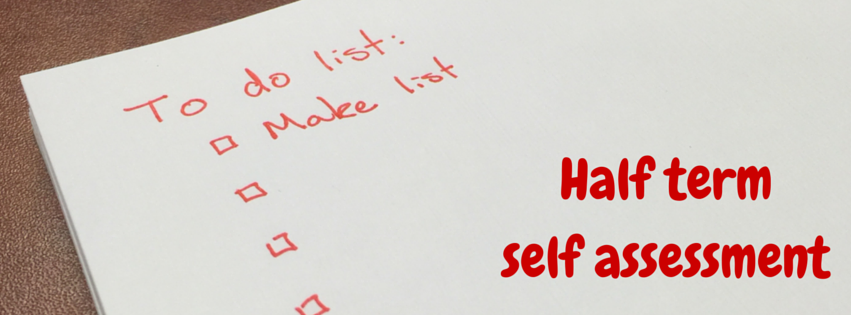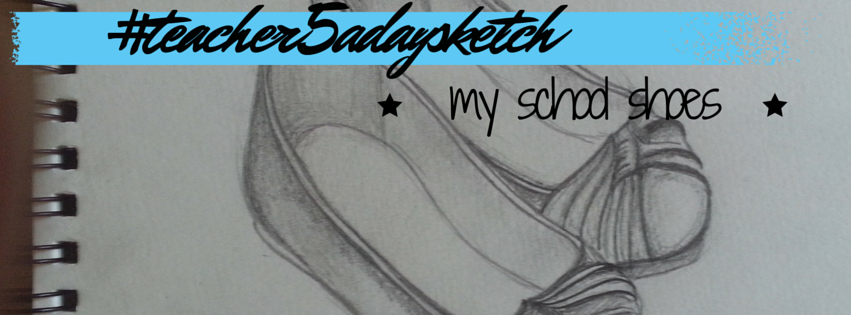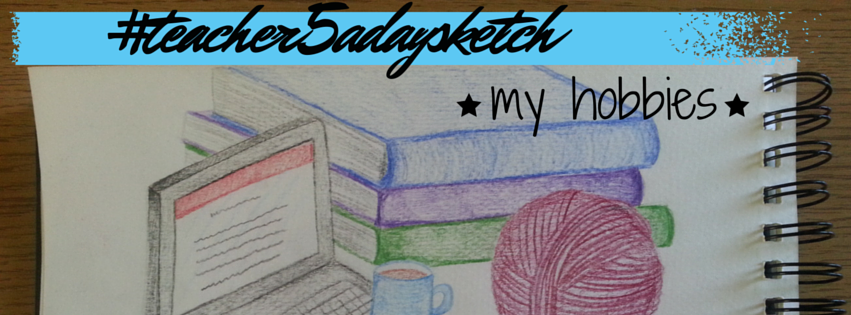This September, however, is the first in twelve years that I won't be standing in front of my new classes, trying to learn names and mentally tweak my seating plan. I won't be establishing my new homework routines, working out who needs extra support and who requires constant challenge. I won't be painstakingly transferring data into my markbook and I won't be getting to know any of the names, faces and personalities that the data belongs to.
(Not Going) Back to School21/8/2020 This time of year I usually return to my blog, feel guilty about having done nothing with it for yet another academic year, write a post about how things will be different, then promptly neglect it again for another twelve months. I blame motherhood entirely for this; I have spent a large proportion of the last five years either pregnant, on maternity leave, or trying to establish a new work/life balance, one that didn't allow me to stay up late on school nights blogging.
This September, however, is the first in twelve years that I won't be standing in front of my new classes, trying to learn names and mentally tweak my seating plan. I won't be establishing my new homework routines, working out who needs extra support and who requires constant challenge. I won't be painstakingly transferring data into my markbook and I won't be getting to know any of the names, faces and personalities that the data belongs to. Effective Examples in the Digital Age28/8/2018 Picking apart and reworking my lessons from last year, I noticed that I almost exclusively model worked examples by handwriting "live" rather than pre-typing. I don't recall making a conscious decision to do this, but following a discussion with my husband this weekend about print vs digital media, I thought I'd think more critically whether either style has any considerable advantage.
There are some interesting studies about reading information via print or digital media; this paper from the Research in Learning Technology journal looks specifically at educational materials and this article from Phys.org summarises some of the preferences people have for different media - generally, we prefer printed media for longer, more involved reads and digital media for shorter reads. I also found this study examining handwriting vs typing inputs for students when solving equations; the authors conclude that the only real difference in this scenario is the speed at which students completed the task, with typesetting algebra taking twice as long as handwriting solutions. However, I've not been able to find anything on the modelling of worked examples in Maths, so this blog post is written with the caveat that this is all personal theorising and is not research-based. Stop, Start, Continue, Change 201821/8/2018 In two weeks I'm returning to work after pretty much a year off on maternity leave. I had such plans - I was finally going to sort out my website, blog more, organise the stupid pile of resources on my memory stick, finish my #mathsconf blogs from 2017 (16, 15, ...) - the list goes on. These plans were made in the naivety of late pregnancy, when I'd decided that I had loads of time off and a sleeping baby would be dead easy to work around. Unfortunately, they aren't, and I'd also seriously underestimated my need for a little bit of self-care time - the last thing I wanted to do once I'd got my daughter down for a nap was turn my computer on and start working - so none of my plans actually came to fruition. However, I did manage to finish the book I'd been working on for the Tarquin A Level course and resources (shameless plug but I'm so proud that I finally achieved what I thought was a complete pipe dream of becoming an author - although I have to confess in my head I was the next JK Rowling, not writing maths revision guides). I also wrote a guest post for TeachWire in 45 minute spurts during naps, so I'm not entirely convinced it's any good. Over the last couple of weeks I've made some attempt at deleting some old rubbish resources and trying to plan my first few lessons, but I'm aware that returning to work with a 9-month old (albeit part-time) will involve some serious expectation management on my part. Fortunately, over the last nine months I've become much more accustomed to "that'll do", and my plans for this academic year involve a significant amount of "work smarter, not harder". When I sat down to write this post, I discovered a prompt saved in my drafts from two years ago titled "Stop, Start, Continue, Change", with nothing other than headers. Presumably that was a thing that was going round the blogosphere at the time, so I decided better late than never - so here's my Stop Start Continue Change for academic year 2018-19. START to use homework tasks more effectivelyHomework generates a significant amount of my marking load, and I'm not sure it's always entirely effective. My homeworks are generally a set of problems similar to those worked on in class, giving pupils an opportunity for further practise and for me to identify individual misconceptions when marking their work. The trouble with this is that by the time the homework comes back in, is marked and returned with feedback, a week has passed (due to peculiarities in our timetable, we only see classes once a week) and the feedback becomes less effective as the immediacy is lost. A few years ago I experimented with flipped learning with one GCSE group, to great effect. I'm keen to look at this again this year, perhaps using our MathsWatch subscription to create tasks to revise prior knowledge before beginning a new unit. I also want to look at more effective strategies for revision homework, short of "there's a test next week, revise" - as we're all aware, that's a week off for some pupils! STOP reformatting resources constantlyI admit it, I love a well-formatted resource. Unfortunately, this can occasionally border on obsession, with a tendency for reformatting other people's resources to fit my "style", and also reformatting all of mine every three or four years when I change whatever style I've picked, not to mention dealing with the whole Promethean/Smartbook/PowerPoint choice. This will definitely be stopping this year - I'm not sure how many weeks of my life I've wasted on this pointless task, but it adds next to nothing to pedagogy or pupil engagement, and I don't have the time to burn anymore. However, I will be making sure anything that I make new is in a consistent style with what I've already got and sticking with it! CONTINUE blogging and updatingThis is a bit of a cheat, really - I'm not sure you can consider one blog post a proper return, but I am going to attempt to keep up with blogging and updating this very neglected site this year. I've got a few ideas bouncing around already, and I'm sure the challenges of working part-time and balancing childcare and my career will give me plenty to write about. A fortnightly blog or update sounds manageable, particularly if I keep it short and simple (unfortunately not my forte), so I'll be giving that a go! CHANGE my teaching practice by focusing directly on the impact and effectiveness of my instructionAt the weekend I read Mark McCourt's latest blog in his series on Mastery - of particular interest as I spent ages working on what I thought was an effective "Mastery curriculum" in my previous role. It's the only bit of CPD I've done this year, but it really is an excellently written piece (I almost want to say manifesto). The bit that struck a real chord with me was titled "Moving from Current Practice to Mastery Approach" and examines the pattern of a typical lesson compared with a suggested mastery approach. I'm not going to attempt to paraphrase too far, as it really does need to be read in full - but the gist is that more time is spend on impactful teacher direction, perhaps interspersed with pupils trying examples for themselves, and questioning is planned carefully at each stage.
There is also an interesting discussion about problem-solving - or as Mark titles it, "behaving mathematically" in the section "Phasing Teaching". My biggest takeaway from this was that pupils should not be asked to behave mathematically with content that they have just encountered, as they need time for this knowledge to mature in order to work flexibly with it; instead, pupils should work on problems linked to these topics but relying on earlier learning. As I've already decided that one of my performance management targets is to make use of open-ended or rich problems more effectively, I'll be considering some of these points when planning tasks. Half term self-assessment21/2/2016 Post 21/29 in the Staffrm #29daysofwriting challenge: What went well, even better if? End of half term and back to school tomorrow - I'm keeping myself going with the thought that it's only a really short one until Easter!
What went well:
My school days20/2/2016 Post 20/29 in the Staffrm #29daysofwriting challenge: When I were young... Pinched this idea from @stephenconnor7 ...
What were you like at school? I grew up and went to school in Staffordshire, which had a three-tier system. In Primary and Middle schools, I worked really hard most of the time and, despite not enjoying school when I first started, loved most of my subjects by the end of Year 8. People used to copy answers for their maths work off me all the time! In Year 10, I had a "teenage blip" when I decided that all I wanted to do was Art, and didn't really put a lot of effort into many of my other subjects. Luckily, I still managed to get some decent GCSE results, and turned it around in sixth form. Post 17/29 in the Staffrm #29daysofwriting challenge: Choose a piece of art Today's prompt was "choose a piece of art with one idea of you might use it in the classroom". As a maths teacher, I've predictably picked my favourite piece of artwork by M.C. Escher - when I was little, someone bought me a postcard book of his work, and I still have the postcards in my display folder.
A few years ago, I got a jigsaw puzzle of this monstrosity: #teacher5adaysketch - My school shoes16/2/2016 Post 16/29 in the Staffrm #29daysofwriting challenge: My school shoes So today's prompt is "sketch your favourite pair of school shoes". This was pretty easy, as I only have one pair. I can't stand wearing heels at school, so flats are my go-to. They are a little boring, but very comfortable - let's save the giraffe-esque sandals for the weekend, eh?
#teacher5adaysketch - My hobbies15/2/2016 Post 15/29 in the Staffrm #29daysofwriting challenge: My hobbies As half term is an opportunity to relax, I thought I'd do something different this week - having seen the #teacher5adaysketch challenge on Twitter, I cracked out my sketchbook and pencils to draw "my hobby".
Love is in the air!14/2/2016 Post 14/29 in the Staffrm #29daysofwriting challenge: Sentimentality and graph of a heart When I was younger, I was ridiculously cynical about Valentine's Day - I'd wonder why people needed one special day to tell or show their significant other how much they love them, when surely that should be happening all the time. However, as I'm often working late into the evenings (I get in at 4pm but usually do 2-3 hours at home in the evening), sometimes I find my husband's come in at 5 and I've not even acknowledged him, because I'm so engrossed in school-work. It's very easy to neglect to remind the people who are important to you just how important they are - family and friends as well as significant others.
I SUCK at maths!22/9/2015
A response to Emily-Jane Clark's piece in Monday's Metro Online titled "18 things only people who are rubbish at maths will understand".
The 'war' on textbooks16/9/2015 Three new blogs!26/8/2015
I mentioned in my Pick of Twitter a couple of weeks ago that I'd found a link to blog post prompts. Well, we're on post 40 of 51 now, and I'm getting writer's block, so thought I'd pick a prompt and go with it for today's post. I thought this one looked interesting:
Read 3 posts from blogs you’ve never visited, give a quick take-away from each.
This seemed an opportune moment to refer to the recently created Maths Echo Chamber Twitter account (@MathsEcho) so I popped over to do a bit of random selection.
Miss, do you enjoy teaching?23/8/2015
I'd put money on the fact that I get asked whether I enjoy teaching by at least four or five pupils every term. I started thinking about this and other related questions when writing my post about my journey into teaching a few days ago. It confuses me that pupils ask this - I wonder if they're going to lessons where teachers visibly look like they're not enjoying teaching, or whether they're just buying into the media picture of what the job's like.
My journey into teaching21/8/2015
As I mentioned in my Pick of Twitter last Sunday, I've enjoyed a few stories about people's reasons for and routes into teaching, so I thought I'd post my own today.
My #summer103/8/2015
I mentioned a while ago that I was going to do a #summer10 post at some point; despite the fact that I'm two weeks into my holiday, I've pretty much been living and breathing wedding plans and celebrations for most of those, and I realised this morning that I still have nearly five weeks of holiday left, which is incredibly exciting. So here's my #summer10, the ten things I'd like to achieve in the holiday I have left...
And your starter for ten...28/7/2015 Starters can be a contentious issue; the term "starter" is a hangover from the days of three-part lessons in bite-size chunks, which seem to have fallen from vogue now. However, they are still a key part of my teaching, and today's SBPC looks at why.
In my mind, my lesson "starters" fall into three categories, and they're not mutually exclusive. Sometimes it's appropriate to have a couple of "starter" activities (I'm dropping the quote marks now because I'm irritating myself). I once had a lesson starter that went on for the entire lesson, as it became painfully apparent that the class had completely forgotten to solve simultaneous equations, so my quick prior knowledge check turned into an off-the-cuff revision session. Quantity, not quality?23/7/2015 Today's post is a blog about blogging - does that make it a meta-blog?
I'll start with my fiance's reaction when I told him about the #summerblogchallenge - he was convinced that there was no way I could write 51 meaningful blog posts, and was in danger of just spamming my Twitter feed with rubbish - hence the title of this post. I think he's also concerned that I spent the first day of the summer holidays pre-writing posts and coming up with ideas rather than starting the big it's-the-summer-holidays spring clean of the tip we're currently living in. This got me thinking about what my aims are when I post, and why I do it. When I started blogging this year, I felt a little self-conscious. There are a lot of well-established teaching blogs already out there, and I couldn't see what I could contribute. However, I'm really glad I waded in, as it's really reinvigorated my teaching this year, along with loads of other advantages. So this post is for any on-the-fence would-be bloggers who are debating wading into the blogosphere. Bit of a random topic for my third SBPC, but bear with me. Over the weekend, my fiance dragged me to watch Jurassic World; I wasn't keen, as I missed the Jurassic Park hype when I was younger, and don't really enjoy action films. Since watching Jurassic World, we went back and watched three episodes of Planet Dinosaur - I'd never seen it before and found it fascinating, although the CGI looks a little dated now!
While we were watching it, we ended up discussing the huge time frames involved in the evolution of both dinosaurs and life in general. When I visualise dinosaurs, I imagine all the famous ones like Tyrannosaurus Rex, Stegasaurus and Diplodocus all roaming the planet at the same time. Something that struck me was the phenomenal length of time that dinosaurs in general were on the planet, and the (relative) shortness of the time that each recognisable species was around. |
Categories
All
Archives
August 2020
|














 RSS Feed
RSS Feed
